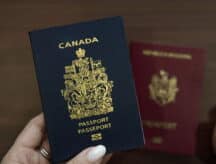Work in Canada After Graduation with a Post-Graduate Work Permit
 International students in Canada have the opportunity, in many cases, to work both during their studies and after their educational programs have been completed. Many foreign students may apply for a post-graduate work permit after their studies in Canada, which allows them to gain valuable Canadian work experience that can lead to Canadian Permanent Residence.
International students in Canada have the opportunity, in many cases, to work both during their studies and after their educational programs have been completed. Many foreign students may apply for a post-graduate work permit after their studies in Canada, which allows them to gain valuable Canadian work experience that can lead to Canadian Permanent Residence.
What is a Post-Graduate Work Permit?
A post-graduate work permit is a work permit that an international student may apply for after he or she has finished a post-secondary educational program in Canada. It is an open work permit, meaning that the holder can work anywhere in Canada, for any company, and may change employers at any time during the validity of the post-graduate work permit.
The validity of a post-graduate work permit depends on the length of the educational program the international student has completed. For a program of study between 8 and 23 months, the permit will generally be issued for the same length of time as the period of study. Therefore, a 10-month program will usually result in a 10-month post-graduate work permit.
For programs two years or longer, a work permit can be issued for a maximum of three years. For example, a foreign student who finishes a four-year program would be eligible for a three-year post-graduate work permit, assuming he or she meets all other program requirements.
Who is Eligible for a Post-Graduate Work Permit?
In order to apply for a post-graduate work permit, an international student must have completed a full-time educational program in Canada, that lasted at least eight months, from one of the following:
- A public post-secondary institution (college, trade or technical school, university or CEGEP in Quebec);
- A private post-secondary institution which operates under the same rules and regulations as a public institution;
- In Quebec, a secondary or post-secondary institution which offers programs of 900 hours or longer than lead to either diplôme d’études professionnelles (DEP) or an attestation de spécialisation professionnelle (ASP); or
- Depending on the program of study, a Canadian private institution that has been authorized by provincial statute to confer degrees.
Before applying for a post-graduate work permit, the international student must have received written confirmation from his or her educational institution that the requirements to complete the academic program have been met. The application for the post-graduate work permit must be made within 90 days of receiving this confirmation, and the international student must still hold a valid study permit at the time he or she applies.
Each foreign student may receive only one post-graduate work permit, regardless of how many programs of study he or she has completed in Canada. The post-graduate work permit cannot be issued to students in distance-learning programs, or students participating in certain scholarship programs.
How can a Post-Graduate Work Permit lead to Permanent Residence?
An individual working in Canada on a Post-Graduate Work Permit has many opportunities to become a Canadian permanent resident. They differ depending on a variety of factors, such as the type of work an individual has completed, and his/her location in Canada.
Almost every province has one or more Provincial Nomination Program categories that specifically target international students who have completed their program of study and started working. Many of these programs require that the Canadian employer offer the individual a permanent job in their company.
If they cannot obtain a permanent job offer from their employer, international students on post-graduate work permits may have other options available to them. For example, the Post-Graduate Worker category of the Alberta Strategic Recruitment stream does not require a job offer from the employer if the program of study was completed in Alberta. In addition, international students who complete a program of study in Quebec and have a high-intermediate level of French may be eligible for the international student stream of the Quebec Experience Class without acquiring Canadian work experience. Ontario, British Columbia and Saskatchewan allow graduates of a Master’s or PhD program to be eligible for Permanent Residence without a job offer or work experience in Canada.
Another option for permanent residence is the Canadian Experience Class (CEC). To be eligible under this category, the applicant must have completed one year of full-time (or equivalent in part-time) work experience in Canada in a skilled position within three years of applying under the CEC. The applicant must also meet required language levels and intend to live in a province other than Quebec.
“Recent international graduates should use their post-graduate work permits to their full advantage,” says Attorney David Cohen, “Whether they choose to return home or to stay in Canada as permanent residents, graduates have a valuable opportunity to gain world class experience in Canada”.
If you are an international student who would like assistance in preparing a post-graduate work permit application, please contact wp@canadavisa.com
To find out if you are eligible for one of over 60 Canadian immigration programs, please fill out a free online assessment today.
- Do you need Canadian immigration assistance? Contact the Contact Cohen Immigration Law firm by completing our form
- Send us your feedback or your non-legal assistance questions by emailing us at media@canadavisa.com



